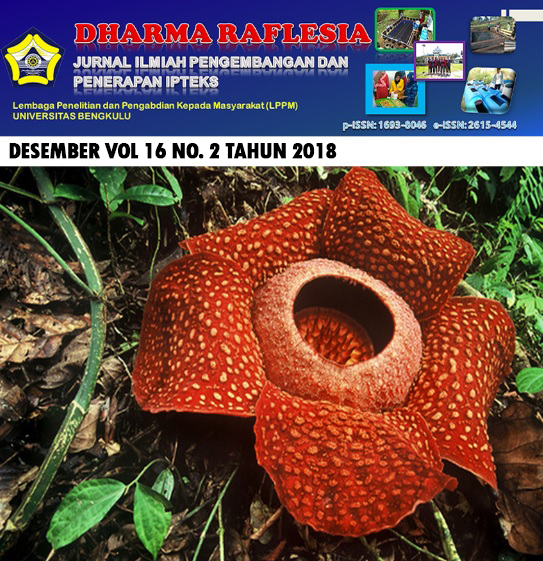Main Article Content
Abstract
Indonesia has culture diversity considered as national asset. But, if culture diversity is not managed well, it will trigger gap, conflict, disunity and violence. Therefore, the attempt to reconstruct four nationality pillars is essential. The goal is to give concept of be-Indonesian as integrative, comprehensive, and also become the foundation to enhance national unity. Four nationality pillars are: Pancasila as national ideology, basic law of 1945 as national constitution, Negara Kesatuan Republik Indonesia (NKRI) as the form of the country and Bhinneka Tunggal Ika as the national motto. The target of this program is students in 3 senior high schools and vocational high school in Bengkulu city. The methods in community service activities are workshops through the provision of material which begins with pre-test activities and ends with post test, FGD, and mentoring. After the activity, the knowledge of the students about the four nationality pillars has increased significantly. From the activities conducted in 2 schools, it is found that the average increase of students' knowledge about the four pillars of nationality increased up to 30.8% and 38.7%. Each school always disseminates knowledge about the four nationality pillars through teaching in each school. The distribution of knowledge about the four nationality pillars is not only done among students, but also for the teachers. The goal is to be able to reconstruct and internalize the four nationality pillars as an effort to strengthen the soul of nationalism and minimize acts of violence that can be a potential for radicalism and national division.
Keywords: Four Nationality Pillars, Nationalism, Student
Article Details
- Authors retain copyright and grant the journal right of first publication with the work simultaneously licensed under a Creative Commons Attribution-ShareAlike 4.0 (CC BY-SA) that allows others to share the work with an acknowledgement of the work's authorship and initial publication in this journal.
- Authors are able to enter into separate, additional contractual arrangements for the non-exclusive distribution of the journal's published version of the work (e.g., post it to an institutional repository or publish it in a book), with an acknowledgement of its initial publication in this journal.
- Authors are permitted and encouraged to post their work online (e.g., in institutional repositories or on their website) prior to and during the submission process, as it can lead to productive exchanges, as well as earlier and greater citation of published work (See The Effect of Open Access).
- This work is licensed under a Creative Commons Attribution-ShareAlike 4.0 International License.
References
- Angelia, Nina, 2017, Pemahaman Penanaman Empat Pilar Kebangsaan terhadap Siswa SMA Negeri 4 Medan, Jurnal Ilmu Pemerintahan dan Sosial Politik UMA, 5 (1) (2017): 15-20.
- Aidulsyah, Fachri, 2016, Berebut Ruang Publik Sekolah Pasca Orde Baru: Studi Kasus Pertarungan Politik Ideologi di Kerohanian Islam (ROHIS) SMAN Eks- Karesidenan Surakarta,Gadjah Mada.Jurnal Studi Pemuda,Vol. 5,No. 1, Mei 2016, hal 370-385.
- Azca, N, 2011, Pemuda Pasca Orba: Pemuda (i) dan Radikalisme Agama (Sebuah Ikhtiar Eksploratif) Yogayakarta: Youth Studies Centre FISIPOL UGM.
- Kamus Besar Bahasa Indonesia yang diakses melalui kbbi.web.id pada Selasa 11 April 2017 Pukul 22.10 WIB.
- Munip, A, 2012, Menangkal Radikalisme Di Sekolah, Jurnal Pendidikan Islam, 1:159–181.
- Rokhmad, A, 2012, Radikalisme Islam dan Upaya Deradikalisasi Paham Radikal, Walisongo, 20(1):79–114.
- Shandi, Frenilya, dkk, 2014, Hubungan Pemahaman Empat Pilar Kebangsaan Dengan Sikap Siswa Menghadapi Arus Globalisasi diakses http://download.portalgaruda. org/article.php?article=288997&val=7237&title=HUBUNGAN%20PEMAHAMAN%20EMPAT%20PILAR%20KEBANGSAAN%20DENGAN%20SIKAP%20SISWA%20MENGHADAPI%20ARUS%20GLOBALISASI pada Selasa, 22 September 2018 Pukul 02.10 WIB.
- Undang-Undang No 9 Tahun 2013 tentang Pencegahan dan Pemberantasan Tindak Pidana http://webcache.googleusercontent.com/search?q=cache:WzCUjB8ZiQMJ: www.hukumonline.com/pusatdata/downloadfile/lt516675034ff03/parent/lt51667443e5d3d+&cd=1&hl=en&ct=clnk&gl=id&lr=lang_en%7Clang_id di akses pada 20 Juli 2018.
- Widiatmika, Pipit, 2016, Pembangunan Karakter Nasionalisme Peserta Didik Di Sekolah Berbasis Agama Islam, JPK: Jurnal Pancasila dan Kewarganegaraan, Vol. 1, No. 1, Juli 2016, hal 25-33.
References
Angelia, Nina, 2017, Pemahaman Penanaman Empat Pilar Kebangsaan terhadap Siswa SMA Negeri 4 Medan, Jurnal Ilmu Pemerintahan dan Sosial Politik UMA, 5 (1) (2017): 15-20.
Aidulsyah, Fachri, 2016, Berebut Ruang Publik Sekolah Pasca Orde Baru: Studi Kasus Pertarungan Politik Ideologi di Kerohanian Islam (ROHIS) SMAN Eks- Karesidenan Surakarta,Gadjah Mada.Jurnal Studi Pemuda,Vol. 5,No. 1, Mei 2016, hal 370-385.
Azca, N, 2011, Pemuda Pasca Orba: Pemuda (i) dan Radikalisme Agama (Sebuah Ikhtiar Eksploratif) Yogayakarta: Youth Studies Centre FISIPOL UGM.
Kamus Besar Bahasa Indonesia yang diakses melalui kbbi.web.id pada Selasa 11 April 2017 Pukul 22.10 WIB.
Munip, A, 2012, Menangkal Radikalisme Di Sekolah, Jurnal Pendidikan Islam, 1:159–181.
Rokhmad, A, 2012, Radikalisme Islam dan Upaya Deradikalisasi Paham Radikal, Walisongo, 20(1):79–114.
Shandi, Frenilya, dkk, 2014, Hubungan Pemahaman Empat Pilar Kebangsaan Dengan Sikap Siswa Menghadapi Arus Globalisasi diakses http://download.portalgaruda. org/article.php?article=288997&val=7237&title=HUBUNGAN%20PEMAHAMAN%20EMPAT%20PILAR%20KEBANGSAAN%20DENGAN%20SIKAP%20SISWA%20MENGHADAPI%20ARUS%20GLOBALISASI pada Selasa, 22 September 2018 Pukul 02.10 WIB.
Undang-Undang No 9 Tahun 2013 tentang Pencegahan dan Pemberantasan Tindak Pidana http://webcache.googleusercontent.com/search?q=cache:WzCUjB8ZiQMJ: www.hukumonline.com/pusatdata/downloadfile/lt516675034ff03/parent/lt51667443e5d3d+&cd=1&hl=en&ct=clnk&gl=id&lr=lang_en%7Clang_id di akses pada 20 Juli 2018.
Widiatmika, Pipit, 2016, Pembangunan Karakter Nasionalisme Peserta Didik Di Sekolah Berbasis Agama Islam, JPK: Jurnal Pancasila dan Kewarganegaraan, Vol. 1, No. 1, Juli 2016, hal 25-33.
